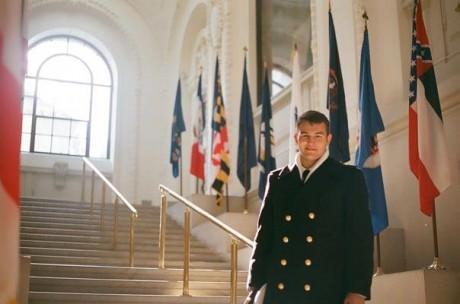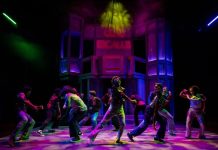This is the sixth in a series of interviews with the cast of The Masqueraders’ production of Translations. Meet Leith Daghistani.

Joel: Introduce yourself to our readers and tell them what other shows you have appeared in and some of the roles you have played.
Leith: My name is Leith Daghistani, I am currently a Junior at the Academy. I am from Fairfax, Virginia but have spent the majority of my life in London in the UK. I had a very small role as Lane, a butler, in The Importance of Being Earnest last year. I have had no proper acting experience prior to that.
Why did you want to be in Translations produced by the United States Naval Academy’s Masqueraders?
I stayed involved with Masqueraders because I enjoy the people in the group; the play that is planned is less of a concern for me, as I like to learn about the play as best I can during the production itself.
What does this production of Translations say to your generation?
Translations is in my mind the perfect play for the Naval Academy. It is a play about the power of language, the traditions of culture and the bigotry which is afforded to conquering nations. Many people have a tendency to misunderstand the influence that we might have on an international level. The United States plays a very active role in the affairs of foreign nations. Whereas we believe that the United States has an obligation to promote our values and institutions overseas, there is a certain tragedy surrounding the loss of culture that occurs along with this process in the minds of those who we affect. This play very much shows that tragic side, from which Americans are shielded in daily life.
Who do you play in Translations and how do you relate to your character?
Hugh is father to Owen and Manus, and the teacher for the local hedge school. A lover of the classical languages, Hugh often uses his superior knowledge to his advantage in his interactions with the other characters. I can absolutely relate to his sense of humor, and it is a great joy to engage with the other actors in a school setting.
What do you admire about your character and what do you not admire?
Hugh struggles with alcohol at times and has a broken relationship with his son Manus. This at times makes it difficult to admire the man. Hugh can be cruel at times. He is not without his troubles. I do admire his love of ancient texts and languages. I also admire him most in his private moments, where he seems more fragile and human and is for fleeting moments more honest in his outlook on life. It can be hard for me at times to comprehend what he has endured in his lifetime, but I have tried in my portrayal of him to show that he has his redeeming qualities, which I believe to be the case.
What have been the challenges you have encountered while preparing for your role and how have you overcome these challenges? How did your director help you?
Hugh has some rather tricky monologues towards the end of the play, and Dr. Stanlake was instrumental in guiding me through the process of conveying a story which develops depth both within the character himself and within the play.
What is your big highlight in the show and what do we learn about your character when you perform it?
As above, the monologues provide great depth for my character. He is pompous before the final act. In his monologues, I found myself able to relate to Hugh on a very human level. He becomes vulnerable and accessible. Hugh is very much past his prime, and struggles with the fact that he cannot connect with his sons, has lost his wife, and is now seeing Ireland be subjected to imperialism and ignorance from British rule. He himself had once gone to war with the British, but realized that there was more to protect at home than was worth dying for in a war which he could not win. He is a man dedicated to the preservation of Ireland, but in a way which is much more subtle than he is given credit for.
What have you learned about yourself during this whole process?
This process has allowed me to learn a lot from those I have been working with. The Masqueraders are a very talented bunch and I am very fortunate to be able to be a part of this production. These are some of my closest friends. I would say that the whole process has made me a better person overall, although that is hard to quantify. Being in a play increases your command of language and rhetoric which is critical for an officer in the military. I also love being able to create and assume the role of a character in the play, shaping them from an intangible piece of text into a human being, with all the associated perfections and imperfections.
What do you want audiences to take with them after watching you perform in Translations?
I hope that audiences are able to see it as a play that is very contemporary in its message, and that the lessons embodied in language and history should be heeded, because they still apply to the present.
What roles would you like to play in the future?
If I’m honest I don’t look for roles, I just like to be involved in theater and the process of producing a good play.
Translations plays tonight November 14th, 15th, 21st, and 22nd at Mahan Hall at The US Naval Academy – 106 Maryland Avenue, in Annapolis, MD. For tickets, purchase them online or at the door.




